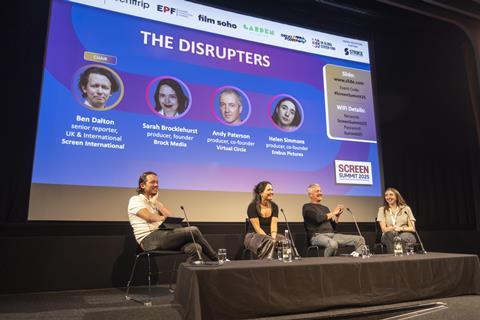
The UK’s Independent Film Tax Credit (IFTC) should be cash-flowed by the UK government, according to a panel called ‘The Disrupters’ at the Screen Summit in London on September 30.
This would help UK producers who are struggling to sustain companies due to the high fees charged by private equity financiers.
“The tax credit is effectively a government bond, and people are making 15 to 20% cash-flowing that while producers are not getting paid,” said Andy Paterson, producer of films including Girl With A Pearl Earring and The Railway Man. “I would say right now to the government, the tax credit – cash-flow it. Do not let people make fortunes out of cash-flowing.”
Helen Simmons, producer at Erebus Pictures, said the IFTC has been “super helpful” and is “attracting more equity investment from the US”, but highlighted the flaws in others making money from it at the expense of producers.
“It’s a bit galling how much you lose every time you get that tax credit and work out what people are making on it,” said Simmons. “There has to be a way of protecting production companies and producers on films from all these different ways, people and companies who are skimming the money off at different stages.
“How can there be an amount left that actually enables a generation of producers to succeed?”
Earlier in the day, the industry audience heard from three ‘Trailblazers’ – established producers Liza Marshall of Hera Pictures, Ed Guiney of Element Pictures and Iain Canning of See-Saw Films. On the Disrupters panel, Simmons and Sarah Brocklehurst of Brock Media said building their businesses to a comparable level is increasingly difficult.
“It was telling that when asked to imagine how [the Trailblazers] might start their companies in this day and age, it was hard for them to imagine that,” said Brocklehurst.
Studiocanal acquired a minority stake in Brock Media this summer; Brocklehurst aims to safeguard its future by working across film, TV, theatre and audio.
“We’re committed to early-career filmmakers – they’re our peers, we want to be making those films,” said Brocklehurst. “It’s difficult to see how that makes any financial sense. The overhead deals or partnerships shouldn’t be expected to subsidise us producing a first or second feature. I should be paid for producing those films, and then also be able to scale up our projects.”
Jeopardy
Simmons, who runs Erebus with Stephanie Aspin, has made three features in the last two years: Luna Carmoon’s debut Hoard, and two films by Julia Jackman – Bonus Track and 100 Nights Of Hero, the latter of which will close the 69th BFI London Film Festival on October 19.
“People often say, ‘You’ve made so much stuff, how are you doing that?’” said Simmons. “It is just working yourself to the bone. There is no other answer. It would be lovely if the answer wasn’t working 13 hours a day, but that’s the only way we have found to incrementally grow our company.”
Brocklehurst said too much of the financial risk is falling on producers. “The producer is at the centre of the ecosystem,” she said. “Everybody is looking at us to make it work. We’ve already developed a project for many years – we’ve been paid very little for that.
“And then, at the point of closing – the gap – that’s where we are looked at to defer our fees. Everybody is looking at us to do that. I know that most funders don’t intend for this to happen, but in practice, I haven’t been in a situation where I have not had to defer fees, or indeed cash-flow prep on my last film – not on my last two films.
“They are otherwise supportive, creative partners, financiers on these films,” Brocklehurst continued. “But the jeopardy lies on our shoulders as producers, and that means the ecosystem is fundamentally broken presently, and we need to resolve that.”
The phrase ‘deferred fees’ is a misnomer, according to Paterson. “’Deferred fees’ just means you don’t get paid,” said the producer, adding he still hasn’t received his fee for Girl With A Pearl Earring, which grossed £3.8m ($7.1m) at the UK-Ireland box office in 2004.
Brock Media’s The Outrun is an independent success story of the last 12 months, grossing £2.4m ($3.2m) at the UK-Ireland box office through Studiocanal and scoring Bafta nominations for outstanding British film and best actress for Saoirse Ronan. However, Brocklehurst detailed the pressures put on her in the financing and production stage.
“We had a 10-and-a-half-week shoot, and we closed finance after we wrapped,” said Brocklehurst to gasps from the audience. “That is a degree of stress and trauma that has taken years to get out of my bones.”
Rethinking
Paterson’s new company Virtual Circle has teamed with Vue Cinemas and Dimension Studios to make theatrical films using virtual production. “Part of what we’re trying to do in rethinking the way things work is go, ‘Let’s cut out the middlemen, let’s see how many bits of the process we don’t need’.
“It’s ludicrous, the amount of transaction fees there are in budgets. Closing should be so much simpler.”
Paterson advocated for greater involvement of corporate money in the independent sector. “We should be running businesses which have corporate cash-flow. If the government wants to take a step towards funding SMEs [small and medium-sized enterprises] that might begin to look like companies of scale, then we need to look at corporate finance.
“If you want us to make big, powerful companies that can do all the great things we’d like to achieve, let’s talk about corporate finance and risk-sharing on a national level.”
The UK industry needs “a completely different level of ambition if we’re going to achieve what we’re capable of,” said Paterson, citing the sale of pay-1 streaming rights on BBC Film titles to Netflix instead of being retained for the BBC’s iPlayer platform. “We’re out of our minds to have the level of talent we have in this country, and we just give it all away.”
The panel also took issue with the ‘lock box’ used in BFI film funding, whereby a portion of income from BFI-backed films is put aside for future projects or staff training. “There’s an expectation that you have to invest your locked box in the finance plan of your next film,” said Brocklehurst. “I had to do that on a recent production where I was already deferring fees. So my company received no benefit from our locked box.”
“You can’t use it to pay yourself,” said Paterson. “Producers should be allowed to do what on earth they want to do with that, then they don’t have to be reliant on those funds.”
















![[L-R]: Amanda Villavieja, Laia Casanovas, Yasmina Praderas](https://d1nslcd7m2225b.cloudfront.net/Pictures/274x183/6/4/1/1471641_pxl_20251224_103354743_618426_crop.jpg)








No comments yet